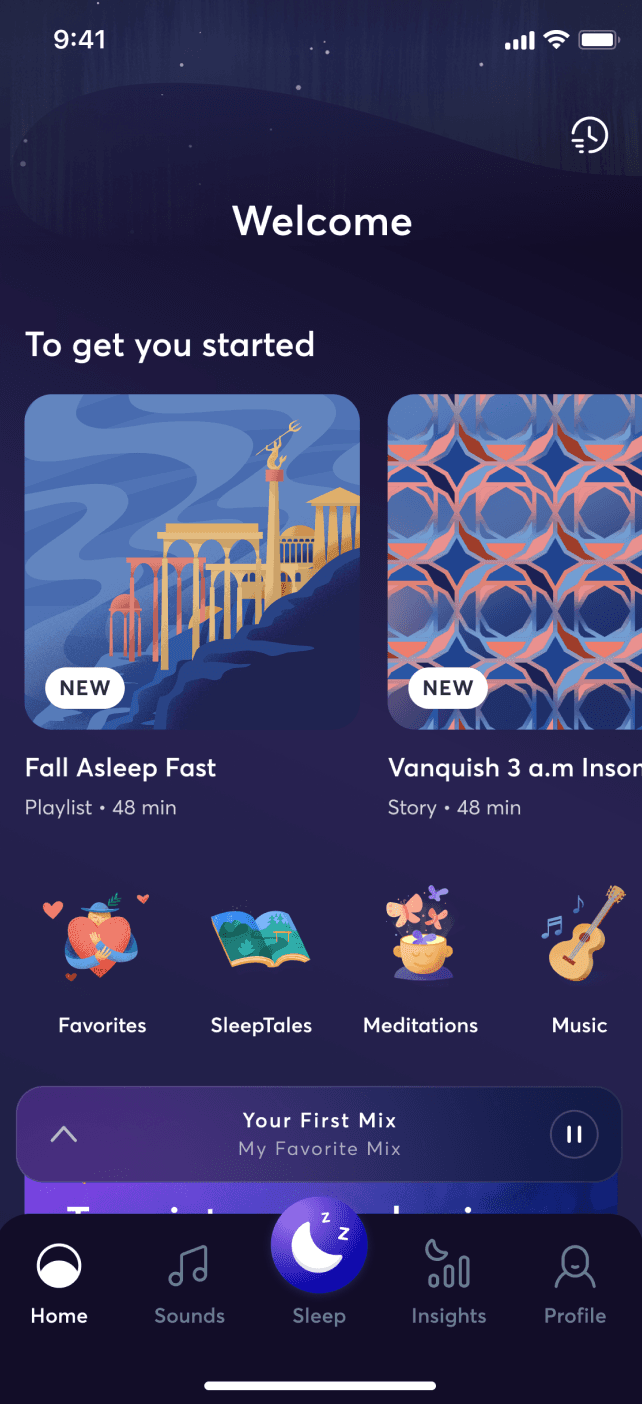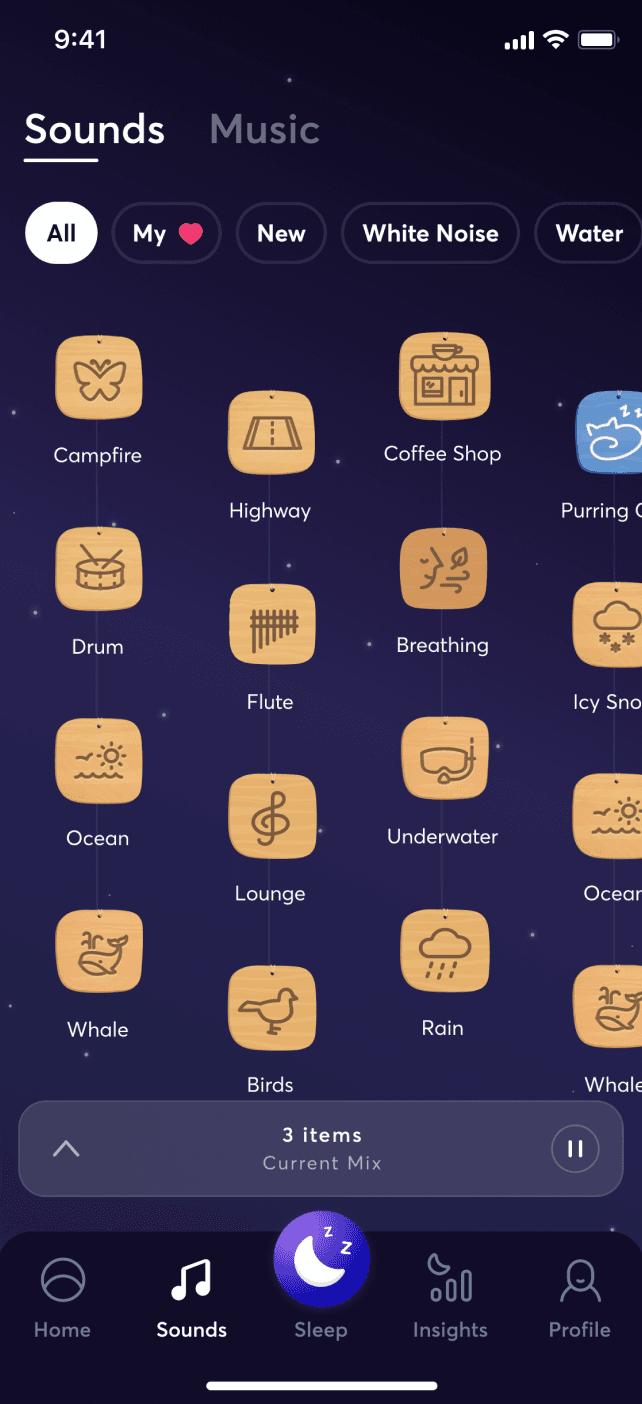
The Brain Unleashed With Binaural Beats
Did you know that some of the world's most brilliant minds, like Albert Einstein, Mary Shelley, and Salvador Dali, attributed their work to the highly creative mind states they accessed?
Imagine being able to write when your mind feels blocked—or being able to lift your mood when you're feeling down. Or sleeping the night soundly before an early morning business flight.
If a technology that allowed you to accomplish these activities quickly and safely existed, would you try it? Well, such technology exists, and it's called binaural beats.
What are Binaural Auditory Beats?
Binaural beats are created when two tones of slightly different frequencies are played simultaneously, one in each ear. The brain processes these tones as a single beat at the difference of the frequencies.
Binaural auditory beats stimulate the brain to achieve desired effects. So, playing and listening to these tones create a rhythm that can improve focus, concentration, and overall mental clarity.
In addition, binaural beats offer various benefits, including reducing stress and anxiety, improving focus and concentration, and inducing sleep. Many people use binaural beats to treat conditions such as sleep disorders, migraines, and chronic pain. While more research is needed to explore the potential uses of binaural beats, they offer a promising tool for relaxation and well-being.
Learn more about Solfeggio Frecuencies
Binaural Beats as Auditory Illusion
Binaural beats are auditory illusions when two tones of slightly different frequencies are presented separately, one to each ear. The illusion is created when the brain combines the two signals, resulting in a third perceived tone.
This perceived tone will have a frequency equal to the difference between the original tones. For example, if a tone with a frequency of 320 Hz is presented to the left ear, and a tone with a frequency of 310 Hz is presented to the right ear, then the brain will perceive a third tone, which is the binaural beat. In this case, the binaural beat is 10 Hz, the difference between the frequencies played in the left and right ear.
However, the difference between the two tones must be less than 30 Hz, and the tones must have frequencies less than 1000 Hz to produce binaural effects. Furthermore, it is necessary to listen to each tone separately, one through each ear. When these conditions are met, binaural beats can provide a powerful tool for creating desired effects.
How do Binaural Beats Work?
The brain perceives the binaural beats and interprets them as a beat of its own. A frequency-following effect occurs as your brain activities match the frequencies set by the beat. This phenomenon makes researchers believe in the possibility of entraining the mind to achieve a particular mental state by listening to binaural beats.
The benefits of binaural beats come when the brain responds with synchronized neural activity and changes the brain waves. Listening to specific frequencies promotes synchronization, which may improve cognitive functions like sleep.
Benefits of Listening to Binaural Beats
Did you know that there are benefits to listening to binaural beats? These beats induce specific states of mind and are helpful for things like relaxation, focus, and sleep.
Below are some of the benefits of binaural beats:
Better Sleep Quality. According to the Centers for Disease Control and Prevention, an estimated 70 million adults in the United States suffer from a sleep disorder. Sleep disorders can range from mild to severe and have various causes. The most common sleep disorder is insomnia, which is difficulty falling asleep or staying asleep. Insomnia can be caused by stress, anxiety, medications, and other medical conditions. Other common sleep disorders include sleep apnea, restless leg syndrome, and narcolepsy. Sleep disorders can significantly impact one's health and well-being, so you must seek medical help if you think you may be suffering from a sleep disorder.
According to a recent study, binaural beats may improve sleep quality. The study found that binaural beats at a delta wave binaural beat frequency of 3 Hz induced delta activity in the brain. Delta activity is associated with deep, restful sleep. The study participants who listened to the binaural beats fell asleep more quickly and woke up feeling more rested.
In addition, they reported experiencing fewer nighttime awakenings and less daytime fatigue. These results suggest that binaural beats may be an effective way to improve sleep quality. If you're struggling with insomnia, consider trying this natural remedy.
Reduce Stress Levels. Most people experience stress at some point in their lives. Statistical research confirms that stress and generalized anxiety disorder affect about 6.8 million adults in the US.
There are ways to help manage stress levels, such as listening to binaural beats.
Binaural beats are sounds that have different frequencies when played in each ear. When these frequencies are combined, they create a third frequency that can encourage specific brainwaves. Studies have shown that alpha frequencies between 8-13 Hz promote relaxation and positivity while reducing stress levels.
Increases Focus and Concentration. Binaural beats are used to help improve focus and concentration. Studies have shown that listening to binaural beats in the beta range (14-30 Hz) can help improve cognitive function and focus. The binaural beats work by creating a different frequency in each ear.
The brain then perceives the difference in frequency and uses it to help improve focus. Binaural beats are most effective for short periods (15-20 minutes). They can be used multiple times per day if needed. There are many different binaural beats programs available online or for purchase. Choose one with a good reputation and offers a money-back guarantee so you can try it risk-free.
Boost Energy Levels. One of the most surprising effects of binaural beats is that they can boost energy levels. Binaural beats encourage the brain to produce more alpha and beta waves, associated with relaxation, while beta waves are associated with cognitive activity. By increasing the production of both types of brainwaves, binaural beats can help to improve mental alertness and overall energy levels.
Enhance Mood and Well-Being. Listening to binaural beats improves mood and well-being. For example, a recent study confirmed the effectiveness of binaural beats in reducing pre-operative anxiety in patients undergoing general anesthesia. The study found that patients who listened to binaural beat audio had significantly lower levels of stress than those who did not listen to the audio.
This finding has an important implication in healthcare, as pre-operative anxiety is a common problem that can adversely affect surgical patient outcomes. Using binaural beats may provide a simple and effective way to reduce pre-operative anxiety and improve patient outcomes.
Pain Management. Binaural beats are effective in pain management. A study shows that theta frequency binaural beats can reduce pain intensity after a brief 30-minute and a more extended one-week on-demand intervention. In the study, the participants who received the binaural beats had significantly lower pain scores than the control group.
The binaural beats appear to work by changing the brainwaves and pain perception. Listening to binaural beats is an effective and non-invasive method of pain relief that anyone can use on an as-needed basis.


Effect of Binaural Beat on Brain Waves
The neurons in the brain use electrical signals responsible for triggering thoughts, emotions, and behaviors. The synchronization of these neurons creates brain waves, typically measured through electroencephalography (EEG).
Brain wave states affect our thoughts, behaviors, and emotions. Let's look at each brain wave state and its associated effects.
Delta waves (0.5-3 Hz) are the slowest waves associated with deep sleep, meditation, and healing. The deeply relaxing delta binaural beats are the perfect accompaniment for sleep.
When delta waves predominate, our brain is in a highly relaxed state but still able to function. Delta waves are associated with healing and regeneration since they provide optimal conditions for the repair and growth of cells and tissues.
Theta waves (3-8 Hz) produce many benefits, from reducing anxiety to reducing chronic pain. Theta brain waves are associated with dreaming, short-term memory, and a meditative state. Relaxing theta waves are excellent for meditation.
Theta waves are especially beneficial during meditation. True and deep meditation is possible by inducing a rhythmic chain of theta waves. Even after the meditation session has ended, theta waves may continue to be present, providing ongoing benefits.
Alpha (8-12 Hz) is the calm state of the conscious brain. The brain is a vital organ that controls many of the body's functions. It is also responsible for our thoughts, emotions, and memories. Therefore, keeping the brain healthy and free from stress is essential.
The alpha brain waves improve brain function during tasks involving working memory and enhance creativity in some individuals. It's also perfect for winding down after a long study session and start relaxing.
Beta (12-38 Hz) is the active thinking and waking state. Beta waves are associated with problem-solving, complex thinking, motor skills, excitement, and the reasoning of daily life. Beta binaural beats alsoimprove mood, performance, and long-term memory. So if you want to rev up your workout or feel more enthusiastic while working, then beta binaural beats are for you!
If you want to start experimenting with binaural beats, we suggest you try the BetterSleep app, where you can enjoy all the binaural beats mentioned above. The application also allows you to mix them with meditations and soothing sounds to create the perfect atmosphere whether you're looking to sleep, relax or focus.
Binaural Beat and its Effect on Brain Activity
The binaural beat can have a variety of effects on brain activity. For example, if one tone has a frequency of 200 Hz and the other has a frequency of 210 Hz, the brain will interpret the difference as a 10 Hz beat. This illusionary beat can influence brain activity by aligning it with the brain's natural rhythms.
Binaural Beats and the Superior Olivary Complex
The superior olivary complex (SOC) is a brain structure responsible for processing auditory information. The SOC is located in the brain stem and is the first part of the brain responsible for processing sound input from both ears.
The SOC receives input from both the left and right ears, which is essential for localizing sound sources. The SOC is also involved in mediating the effects of loud sounds and can help protect the inner ear from damage.
Binaural beats are sound waves that have been shown to have various effects on the brain, including on the SOC. When binaural beats are played, the brain responds by producing electrical activity that replicates the frequency of the beat. This electrical activity can then influence the activity of neurons in the SOC. Studies have shown that binaural beats can help to improve sound localization and to reduce background noise. These findings suggest that binaural beats may be a valuable tool for enhancing auditory processing.
What is Auditory Beat Stimulation?
Auditory beat stimulation is a form of brainwave entrainment. Unlike traditional entrainment methods, which rely on visual or tactile cues, auditory beat stimulation uses sound to guide the brain into a desired state.
The technique is based on the principle that when two tones of slightly different frequencies are played together, the brain will produce a third tone at the difference between the two frequencies.
By altering the frequencies of the two tones, auditory beat stimulation can induce states ranging from deep relaxation to intense concentration.
Binaural Beat Stimuli for Anxiety
Some people believe that listening to binaural beats can have beneficial effects, such as reducing stress and promoting relaxation.
A recent study published in the journal of Alternative Therapies in Health and Medicine sought to investigate whether listening to binaural beats could help reduce anxiety levels in people who identify as mildly anxious. In the study, participants were asked to listen to binaural beat tapes at least five times weekly for four weeks to binaural beats.
The participants' anxiety levels were measured at the beginning and end of the study using a standardized questionnaire. The results showed that listeners of binaural beats experienced a decrease in anxiety levels throughout the study. These findings suggest that listening to binaural beats may be a helpful way to decrease anxiety levels in mildly anxious people.
The Science Behind Binaural Beats
Binaural beats have been shown to induce various states of consciousness, including relaxation, meditation, and sleep. The mechanisms by which binaural beats produce these effects are not fully understood, but they are thought to involve the entrainment of brainwaves.
Binaural Beats and their Effect on Visuospatial Working Memory and Cortical Connectivity
Binaural beats are an auditory illusion created when two different frequencies are played through separate speakers, resulting in the perception of a low-frequency third tone. This phenomenon has been shown to have various cognitive and physiological effects, including improved focus and concentration, increased relaxation, and reduced stress and anxiety.
Some research has also suggested that binaural beats can positively influence cognitive performance. In a recent study, participants were asked to listen to 15Hz binaural beats during a visuospatial working memory task. The results showed that the participants who listened to the binaural beats had significantly higher accuracy rates than those who did not. Additionally, the binaural beats appeared to change the properties of the cortical networks supporting task performance.
These findings suggest that listening to binaural beats improves cognitive function and alters brain activity. Further research is needed to confirm these findings and explore the potential applications of this phenomenon.
Binaural Beat Technology in Humans: Psychologic and Physiologic Effects
In a recent study, researchers examined the effects of binaural beats on psychologic and physiologic measures. The study participants listened to binaural beats for 60 days, and the results showed that the technology positively affected self-reported measures of anxiety.
Further, the participants also showed decreased blood pressure and heart rate, suggesting that binaural beats may also have physiologic benefits. Overall, the results indicate that binaural beat technology is a promising tool for improving mental health.
Neuromagnetic Responses to Binaural Beat in the Human Cerebral Cortex
Binaural beats are controversial, with some researchers claiming they can induce specific brain activity and others asserting that they have no effect—a recentstudy controlled for beat frequency, carrier tone frequency, and exposure duration. The goal was to investigate binaural beats and their effect on the cerebral cortex.
The results indicated that listening to binaural beats for 10 minutes induces theta activity in the entire cerebral cortex of the experimental group.
Note that the cerebral cortex is the outermost layer of the brain and is responsible for the higher-level processes of the human brain, including language, memory, reasoning, thought, learning, decision-making, emotion, intelligence, and personality.
The cortex is divided into four main lobes: the frontal lobe, the temporal lobe, the parietal lobe, and the occipital lobe. Each lobe has a specific role in processing information. For example, the frontal lobe is responsible for executive functions such as planning and decision-making, while the temporal lobe is responsible for processing auditory information.
The cortex is also home to the primary motor and somatosensory cortex, responsible for controlling muscle movement and sensing touch.
The above information suggests that binaural beats may help investigate cortical activity and interactions between different brain regions. Nonetheless, further research is needed to determine whether binaural beats can improve cognition or treat disorders characterized by abnormal cortical activity.
Efficacy of Binaural Auditory Beats in Cognition, Anxiety, and Pain Perception
A meta-analysis study was conducted to determine the efficacy of binaural auditory beats on memory, attention, and anxiety. The results of the analysis showed that binaural-beat exposure is an effective way to affect cognition, reducing anxiety levels and the perception of pain without prior training.
The direction and magnitude of the effect depend upon the frequency used, time under exposure, and the moment in which the exposure takes place. These findings suggest that binaural beats could be a valuable tool for improving cognitive functioning in various populations.
The Neurological Mechanism Involved in Enhanced Memory Recall Task Following Binaural Beat
The brain produces a response to binaural beat in three main frequency bands, the delta at 0.5-4 Hz, theta at 4-8 Hz, and Alpha at 8-12 Hz. In general, low-frequency waves are associated with deep sleep or anesthesia, while higher-frequency waves are associated with alertness or focus.
Despite these well-established frequency band classifications, some evidence suggests that there may not be as distinct boundaries between these frequency ranges as initially thought.
Instead, it seems there may be more of a continuous range or "slope" between these different states instead of rigid boundaries. Binaural beats in the delta and theta ranges induce hypnotic states.
Binaural beats are also linked with improved memory because they activate both brain hemispheres simultaneously and enhance coherence within each hemisphere.
Side Effects of Binaural Beats
The side effects of listening to binaural beats are not well-known, as there is limited research on the subject. Some studies have linked binaural beats to increased feelings of depression, while other studies have found that binaural beats can help alleviate anxiety and improve mood.
Additionally, some people who listened to binaural beats experienced short bursts of anxiety, anger, and confusion that lasted for a short time. However, inconclusive research supports binaural beat as a stand-alone medical treatment tool. Binaural beat therapy can't be used in place of conventional therapy, but it could be used as a complementary strategy if discussed with a doctor.
Binary beats are good for mental health as they encourage positive feelings. As many binaural beats are freely available online, the beats' reactions vary from one individual to another. Individuals must experiment with different frequencies to see what works best.


How to Use Binaural Beats to Get the Best Results
The best way to use binaural beats is to try different frequencies and carefully consider how you feel during and afterward. Choosing frequencies that best align with your desired effect is also ideal. It's important to know that binaural beats are most effective when listening with earphones.
If you're new to binaural beats, it's essential to understand how they work and how to use them safely. Here are a few tips:
1. When trying to relax and focus your mind, it is essential to be in a comfortable position. It would be best to sit or lie down in a way that doesn't strain your body and ensure you won't be interrupted for a while. A comfortable position will help you to focus on the binaural beats and get the most out of them.
There is no perfect way to listen to binaural beats, but being comfortable is vital. You may want to experiment with different listening positions until you find what works best for you. Whether sitting up straight or lying down with your eyes closed, as long as you're comfortable, you'll be able to focus on the binaural beats and let them do their work.
2. Start with lower frequencies and work your way up. Binaural beats can have various effects, so starting slow and seeing how your body reacts is best.
Remember that one of the critical benefits of binaural beats is that listeners can customize them to fit their needs. So, starting with lower frequencies is helpful when first listening to binaural beats.
Listening to lower frequencies can help the brain to adjust more quickly to the new sound. Starting with lower frequencies can also reduce potential side effects, such as headaches or nausea. Ultimately, starting with lower frequencies can be a helpful strategy for getting the most out of binaural beats.
3. Binaural beats have been shown to have various potential benefits, including reducing anxiety and improving focus. However, it may help to limit listening to binaural beats to about 30 minutes. Like any sound therapy, too much can be overwhelming, especially for beginners.
4. If you're pregnant or have any medical conditions, please consult your doctor before using binaural beats.
With these tips in mind, you're ready to start exploring the world of binaural beats!
Binaural Beats for Sleep
If you're looking for a natural way to improve your sleep, you may want to try binaural beats. Binaural beats are played at different frequencies in each ear.
These frequencies create a third, deeper tone that is said to have a calming effect on the brain. Research suggests that binaural beats can help to improve sleep quality, reduce stress and anxiety, and promote relaxation. Many recordings are available online or through apps if you want to try binaural beats. Start by listening for a few minutes before bedtime and see if you notice any improvement in your sleep.
Binaural Beats for Focus
Though the science is still inconclusive, some experts believe that binaural beats can help improve focus. Binaural beats are low-frequency tones that are played in each ear separately. Proponents of this method say that the brain responds to these different tones by creating its third tone, which helps to improve focus and concentration.
While there is still much research in this area, some studies have shown promising results. For example, one study found that participants who listened to binaural beats were better able to complete task performance requiring sustained attention. So, while we don't know if binaural beats can help improve focus, it's worth considering if you're looking for ways to improve your concentration.
Binaural Beats for Relaxation
Binaural beats can induce relaxation. When binaural beats are played at a frequency of around 4 Hz, it can help to slow down the brainwaves, leading to a state of relaxation. There are many ways to use binaural beats, including listening to recordings or special headphones that deliver the tones directly to the ears. Some people find that using binaural beats helps them to relax and fall asleep more easily, and it may also help to reduce stress and anxiety.
Can Binaural Beats Help You Sleep Better?
Some people find that listening to binaural beats can help them sleep better. During wakefulness, our brainwaves are predominately fast and low in amplitude. This changes when we enter into sleep, specifically non-REM sleep. In non-REM sleep, our brainwaves become slower and higher in amplitude.
The theta and delta waves dominate during this stage of sleep, with theta waves being slower than delta waves. These low-frequency waves aid relaxation and sleep. The delta waves are the slowest of all brainwaves and are responsible for deep, restorative sleep. If you want a good night's rest, aim for a sleeping pattern that includes REM and non-REM sleep.
How Binaural Beats Trigger Hormonal Changes for Better Sleep
Some scientific research supports the use of binaural beats for sleep. One study found that participants who listened to binaural beats before bedtime fell asleep more quickly and slept more soundly than those who didn't listen to binaural beats.
The Dehydroepiandrosterone (DHEA). Dehydroepiandrosterone (DHEA) is a hormone that functions as a master hormone, helping to produce other hormones when needed. DHEA plays an important role in promoting immune function and helps in protecting the body against diseases. DHEA promotes sleep quality as it suppresses cortisol, a hormone that triggers alertness.
Cortisol Hormone. The hormone cortisol is a stress hormone released by the adrenal gland in response to stress. High cortisol levels can lead to various health problems, including high blood pressure, weight gain, and anxiety. A recent study found that binaural beats may help to reduce cortisol levels.
In the study, participants who listened to binaural beats reduced cortisol levels by about 70 percent. Binaural beats are a type of sound healing that uses two different sound frequencies to create a beat. The study found that the binaural beats helped lower cortisol levels by stimulating the release of endorphins, hormones that have mood-boosting effects.
Melatonin Hormone. Melatonin is a hormone that helps to regulate the body's sleep-wake cycle. The body produces melatonin several hours before bedtime, and levels remain high throughout the night. This increase in melatonin production makes people feel drowsy and promotes sleep. Additionally, research has shown that melatonin can help to improve sleep quality.
Taking melatonin supplements improves sleep quality in people with insomnia. Furthermore, listening to binaural beats has been shown to increase melatonin production. Binaural beats are sound waves that create a frequency-following response in the brain. When this response is coupled with a relaxing auditory scene, it can help to induce sleep.
Binaural Beat vs. Meditation
Meditation is a practice in which an individual uses a technique – such as mindfulness, or focusing the mind on a particular object, thought, or activity – to train attention and awareness, and achieve a mentally clear and emotionally calm state.
Scientificresearch has shown that meditation can positively affect many different areas of health, including reducing stress, anxiety, pain, and blood pressure. Meditation has also been found to improve sleep quality and boost immune function. In addition, meditation has been shown to increase levels of grey matter in the brain, which is associated with improved memory and concentration. Whether you are looking to improve your health or find some inner peace, meditation may be worth trying.
Binaural sound is often likened to meditation, as it can help to induce a state of relaxation and calm. When we meditate, we often focus on our breath and allow our thoughts to drift away.
Committing to doing a daily meditation can be challenging, but binaural sound can help create the perfect environment for meditation. The gentle rhythms and calming tones help to quiet the mind and allow us to focus on the present moment. In addition, binaural sound can also help to reduce stress and anxiety levels. Listening to binaural sounds can lower blood pressure and heart rate and improve mood and sleep quality. The binaural sound is the perfect way to unwind and find inner peace for many people.
Binaural Beats and Lucid Dreaming
Lucid dreaming is a state of consciousness in which the dreamer is aware that they are dreaming and can control their dreams. Binaural beats may help induce lucid dreams by increasing brain wave activity in the regions of the brain associated with dreaming.
Binaural beats are effective in inducing lucid dreams. In one study, participants who listened to binaural beats before bed were more likely to report having a lucid dream than those who did not listen to binaural beats.
Binaural beats have also reduced nightmares duration. Nightmares are a type of dream that can cause fear, anxiety, and distress. Binaural beats may reduce the duration of nightmares by decreasing brain wave activity in the regions of the brain associated with fear and anxiety.
7 Tips for Using Binaural Beats for Lucid Dreaming
1. Get to know your sleep cycles. You must know your sleep cycles to use binaural beats for lucid dreaming. If you're unsure when you're in a light sleep stage, try using an app like Sleep Cycle or Pillow to track your sleep patterns.
2. Pick the right time. The best time to use binaural beats for lucid dreaming is during the lightest stage of sleep, which is usually around 60-90 minutes after you fall asleep.
3. Put on your headphones. Ensure you wear comfortable headphones that won't fall off while you sleep. You don't want to be jolted awake by your binaural beats suddenly stopping!
4. Start with a lower frequency. If you're new to using binaural beats, starting with a lower frequency is best. You can gradually increase the frequency as you get more comfortable with the effect.
5. Focus on your intention. Before you start listening to the binaural beats, take a few minutes to relax and focus on your choice for lucid dreaming. Visualize what you want to dream about and repeat affirmations such as "I will remember my dreams" or "I will have a lucid dream tonight."
6. Listen for 30-60 minutes. It's essential to listen to the binaural beats for at least 30 minutes, preferably up to an hour, to give your brain enough time to reach the desired state.
7. Keep a dream journal. Once you've started using binaural beats for lucid dreaming, it's helpful to keep a dream journal so you can remember your dreams. A dream journal will also help you notice patterns and symbolism in your dreams that you can interpret for further meaning.
Binaural Beats vs. Monaural Beats
Binaural beats and monaural beats are two types of auditory brainwave entrainment, a technique used to change brainwave patterns. Both binaural and monaural beats work by playing different tones in each ear, which the brain interprets as a single tone. The difference between binaural beats and monaural beats is that binaural beats have different frequencies in each ear, while monaural beats have the same frequency in both ears.
Binaural beats are said to be more effective at changing brainwave patterns than monaural beats, as the difference in frequency between the two tones is said to create a more pronounced effect on the brain. However, monaural beats are still thought to be effective and may be better suited for those new to auditory brainwave entrainment, as they are less likely to cause any discomfort.
Binaural Beat Combined with Autonomous Sensory Meridian Response
Getting enough sleep is important for overall health and well-being. Yet, many people suffer from sleep disorders that make it difficult to get a good night's rest.
One potential solution to sleep disorders is using auditory stimuli, such as binaural beats. However, listening to binaural beats can be uncomfortable for some people, making it even more difficult for them to sleep.
According to a recent study, a combination of 6 Hz binaural beats and ASMR triggers can help to induce theta brain waves and improve psychological stability. Theta waves are associated with deep relaxation and meditative states, making them ideal for promoting sleep. The findings suggest that this combination of auditory stimuli could improve sleep quality in people with trouble sleeping.
Wrap Up
If you're looking for a way to improve your focus and concentration, binaural beats might be worth a try. This type of brainwave entrainment involves listening to two different tones in each ear, which causes your brainwaves to sync up with the frequency of the beat.
Binaural beats can help improve task performance, increase creativity, and even promote deep sleep. If you're interested in giving binaural beats a shot, check out BetterSleep for some great listening options.


Binaural Beat Stimulation FAQs
Do Binaural Beats Enhance Brain Power?
Binaural beats are a type of sound wave that can create various effects on the brain. Some believe that binaural beats can help improve focus and concentration and increase overall brain power. However, there is no scientific evidence to support these claims.
While binaural beats may have some potential benefits, more research is needed to determine their efficacy. Additionally, it is important to note that binaural beats should not be used as a replacement for traditional medical treatment. If you are experiencing any cognitive issues, please consult a qualified healthcare professional.
How to Listen to Binaural Beats Correctly?
Binaural beats are auditory illusions when two different tones are played in each ear. The brain perceives these tones as a single tone, which is usually at a lower frequency than either of the two individual tones. Binaural beats are often used for relaxation and meditation, as they can help to encourage the brainwave state known as alpha waves.
Experiencing the full effect of binaural beats requires listening to them using headphones. This scheme ensures that each ear hears a different tone and allows the brain to easily combine the two tones into a single perception. When listening to binaural beats, it is also important to relax and close your eyes, as this can help you to focus on the tone and achieve a deeper state of relaxation.
Can Binaural Beats Improve Focus?
Some people believe that binaural beats can help to improve focus and concentration. The theory is that by providing a steady rhythm for the brain to follow, binaural beats can help to reduce distractions and improve focus. Some evidence supports this claim, but more research is needed to confirm its effectiveness. If you're looking for a way to improve your focus, binaural beats may be worth trying.
What is Binaural Beat Perception?
Binaural beats result from the brain's response to auditory signals from each ear. Integrating the auditory signals in the superior olivary complex and the inferior colliculus affects binaural beat perceptions. The integration results in neuroelectrical discharge that travel along the brainstem up to the auditory cortex.
Do Binaural Beats Work for Studying?
Binaural beats are sounds that are supposed to help you focus while studying. When you listen to two tones with different frequencies, your brain will interpret the difference between the two frequencies as a beat. This beat is then supposed to help you focus and concentrate on your work. However, no scientific evidence supports the claim that binaural beats help people focus or improve their grades.
What is Brainwave Entrainment Music?
Brainwave entrainment music is a type of music that uses specific frequencies to encourage the brain to produce brainwaves in specific patterns. Encouraging the brain to produce certain types of brainwaves will be able to function more effectively.
Encouraging the production of alpha waves relaxes the brain for better concentration and focus. Similarly, by encouraging the production of beta waves, it is thought that the brain will be better able to handle stress and anxiety. There is a growing body of research that suggests that brainwave entrainment music can be effective in treating a variety of conditions, including insomnia, depression, and ADHD.
Does Brainwave Entrainment Work?
Brainwave entrainment is a technique that uses sound waves to influence the brainwaves of a listener. The idea is that by aligning the frequency of the sound waves with the brain's natural frequency, the brain will be entrained or brought into a state of harmony. There is some scientific evidence to support this claim.
For example, studies have shown that auditory stimuli can influence brainwaves and that different types of auditory stimuli can produce different effects on the brain.
However, note that not all experts agree on the efficacy of brainwave entrainment, and more research is needed to confirm its effectiveness. Nevertheless, it remains a popular technique many people use to improve their mental state and well-being.
How Long Should I Listen to Binaural Beats?
Many people enjoy binaural music to reduce stress and promote relaxation. However, there is no one-size-fits-all answer to how long to listen to binaural music. Some people prefer to listen for short periods, while others find longer sessions more effective. Ultimately, it is up to each individual to experiment and find what works best for them.






















